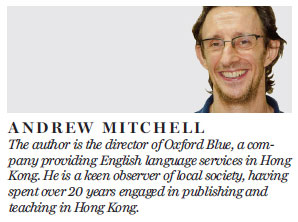Correcting misconceptions about textbook publishing
Updated: 2015-10-14 09:23
By Andrew Mitchell(HK Edition)
|
|||||||
Editor's note: This article is part of a series discussing educational publishing in Hong Kong. Here the writer addresses some popular misconceptions about the industry.
As I was walking down the road the other day, I passed an overexcited boy accompanied by a domestic helper weighed down by a backpack full of books. This could only mean one thing: The new school year is upon us.
Here in Hong Kong the new school year just would not be the same unless it was preceded by complaints in the press about the exorbitant price of school books. This year was no exception, with Apple Daily reporting that parents of Secondary One students at TWGHs Mrs Wu York Yu Memorial College, located in Shek Yam in the New Territories, had been saddled with a bill of HK$4,700 for their children's textbooks.
This is undoubtedly an important issue, and one that the media should certainly be tackling. However the report I read, like so many of the reports on the pricing of textbooks that have appeared in the local press in recent years, contained a number of misconceptions.
Before I address some of these misconceptions, I should lay my cards on the table. During my time in Hong Kong, I have spent over 15 years working full-time for educational publishers and I continue to work in the industry on a freelance basis today. So although I am by no means an apologist for local educational publishers, I am sympathetic to their overall plight.
One of the most popular misconceptions about educational publishers here is that they are constantly updating their materials in order to justify price increases and kill off the second-hand market. Now, I can only talk with any degree of authority about English-language textbooks for secondary schools, but once a new course book has been put on the Education Bureau (EDB)'s Recommended Textbook List, publishers are not allowed to revise it for five years.
A related misconception is that educational publishers like nothing more than revising their course books. However, as a former publisher myself, I can state quite categorically that what publishers really like is not revising their course books. People who have never worked in the publishing industry tend to underestimate the amount of work required to produce a new edition of an existing course. It is a task that requires a whole team of writers, editors, artists and designers, and it is only ever undertaken if absolutely necessary. After all, why spend all that time and money if you can just keep selling the existing course?
So if publishers are reluctant to update their courses, why do they do it so regularly? Well, essentially they have no choice. Even for a subject like English language, where the basic content (grammar, vocabulary, skills, etc) remains the same, publishers need to revise their courses to bring them up to date. In a modern city like Hong Kong, what is popular one year is rarely popular the next, so well before a course is finally revised teachers will be complaining to publishers that the students think their textbooks are "out".
The issues surrounding the revision of textbooks are not the only misconceptions regarding the local educational publishing industry. Others include the undesirability of full-color textbooks (many teachers actually like them because they help to motivate students) and the similarity of new and old editions of a course (according to the EDB's Guidelines on Submission of Printed Textbooks for Review the "revision of textbooks will not be permitted if the justifications provided are not substantial and no significant improvement has been made to the textbook content"). They also include the supposedly unwanted "bundling" of free materials with course books (this is often done at the behest of teachers).
Another of the misconceptions about the local educational publishing industry involves the exaggerated claims made for the various substitutes put forward for commercially printed textbooks.

(HK Edition 10/14/2015 page9)